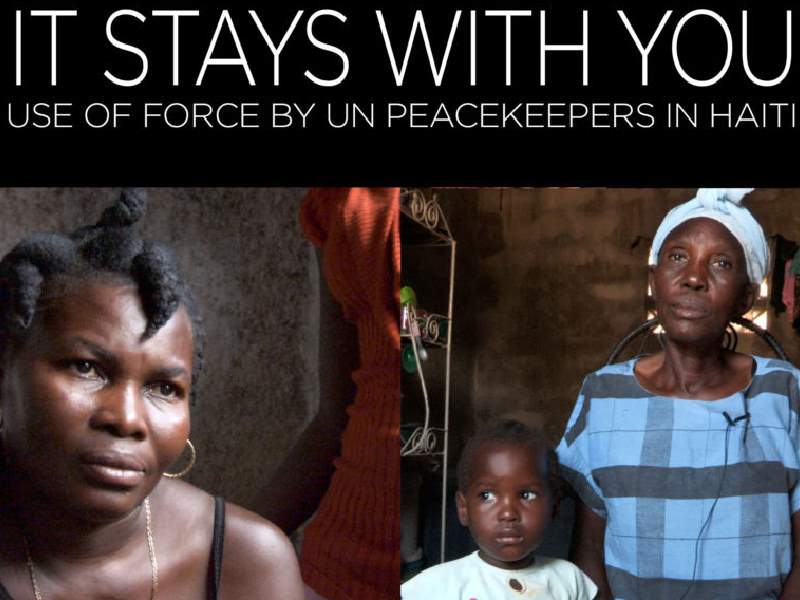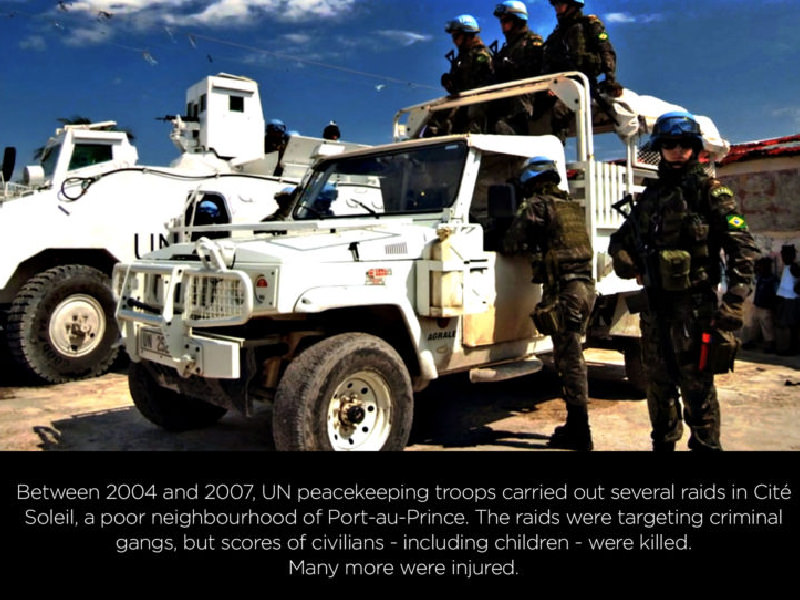|
By Nina Kalirai
It Stays with You: Use of Force by UN Peacekeepers in Haiti is a very raw, impactful documentary that evokes many emotions. The documentary focuses on a handful of families that were impacted by the raids conducted by United Nations Peacekeeping Troops, in Cité Soleil, from 2004 to 2007.
The documentary interviews a few citizens of Haiti, in depth, to address the impact the UN’s Mission des Nations Unies pour la Stabilisation en Haïti (MINUSTAH) raids had on its citizens and what their lives are like now. All of those who were interviewed lost family members from siblings, to parents, to friends they considered family. All the subjects interviewed recall MINUSTAH’s bullets reigning from helicopters in the sky, piercing through their homes killing innocent friends and family members.
MINUSTAH was put into place after the country’s President Bertrand Aristide left Haiti for exile, following an armed conflict that spread across the country. However, as many of the citizens interviewed recall, MINUSTAH never had a strategy implemented to target those involved in the armed conflict. Rather, MINUSTAH aimlessly shot its bullets down into cities that the armed conflict had spread into.
© Caribbean Tales | Vimeo
Many of those interviewed were extremely happy to be able to have their side of the story shared to the world. Doctors working at the hospital in Cité Soleil were also interviewed, and recalled seeing children as young as three years old being brought in, held in their mother’s arms, with their insides viciously hanging out.
During a panel discussion following the film, one audience member asked Cahal what happened in Haiti after the film was produced, and what the overall impact has been in terms of the UN making reparations.
Cahal answered the question stating: “We heard that there’s an internal investigation in the UN. It’s a monster organization and the departments don’t necessarily negate all the peacekeeping or the military side of things, however they don’t really know about human rights, so we know they’re starting to talk to each other about this. The most we can hope for is an independent public investigation, which will be really hard to get.”
One of the most emotionally difficult parts of the documentary was at the end, when those who were interviewed were asked how their lives have changes, since the implementation of the MINUSTAH during 2004 to 2007, and the loss of loved ones. One young girl breaks down into tears, after losing her father during this time, stating that if he was still here she would have been able to go to school and live her life as a child should.
Overall, this documentary was very informing and impactful for viewers who are both aware and unaware of the force used by the United Nations in Haiti from 2004 to 2007. Director Cahal McLaughin did a great job on depicting the impact these raids had, through the amount of people he chose to interview. Focusing on these few citizens helped drive the overall message of the documentary.
|
Recent Posts
Categories
All
Archives
February 2022
|
|
GET THE APP!
Listen to VIBE 105 anywhere you go!
|
OUR STATION
|
TUNE IN RADIO
|
STAY CONNECTED
|
Copyright © 2021 Canadian Centre for Civic Media and Arts Development Inc. Except where otherwise noted, presentation of content on this site is protected by copyright law and redistribution without consent or written permission of the sponsor is strictly prohibited.




 RSS Feed
RSS Feed


